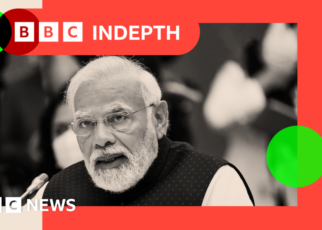[ad_1]
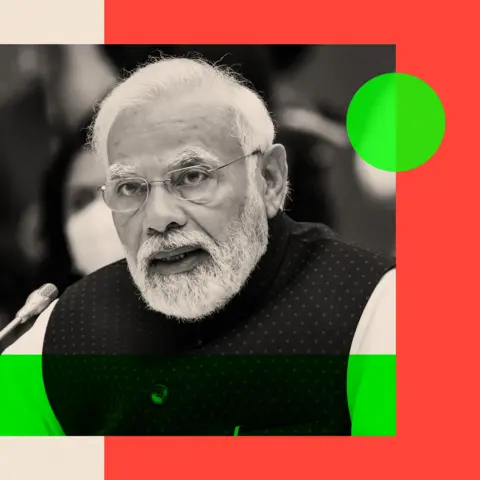 Getty Images
Getty ImagesIndia is no stranger to coalition governments.
Some of the world’s largest coalitions, comprising between six and a dozen parties, have been formed in the world’s most populous democracy.
From 1989 to 2004, six general elections produced no single-party majority. Some of these coalitions have been particularly chaotic: between 1989 and 1999, eight were formed and many quickly collapsed.
But some of India’s most significant economic reforms and highest growth rates have come under coalition governments, led by both the Congress and the Bharatiya Janata Party (BJP).
Now, for the first time since 2014, India will have a coalition government, with no single-party majority.
Narendra Modi of the BJP, set for a third term as prime minister, has seen his majority reduced by a resurgent opposition, and now primarily relies on two allies in his National Democratic Alliance (NDA) for a parliamentary majority.
But will Mr Modi, who always ruled with a majority as chief minister of Gujarat state and as India’s prime minister, and dominated politics for a decade, be able to run a coalition?
Can he shed his domineering style and carry disparate regional allies along? And will he curb a growing personality cult stoked by his party and a friendly media to adopt a more consensual, humbler image?
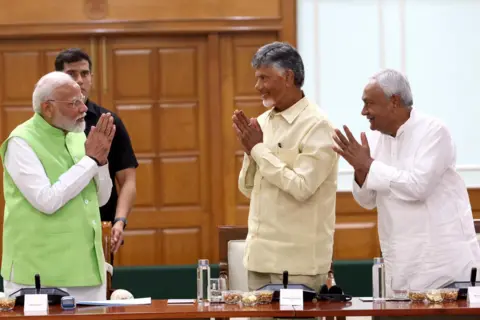 N Chandrababu Naidu/Twitter
N Chandrababu Naidu/TwitterMany believe it’s unlikely to be smooth sailing for Mr Modi in a coalition.
The two allies that Mr Modi is most dependent on are two regional parties, Janata Dal (United) and Telugu Desam Party (TDP). They have 28 seats between them. Both are led by veteran, astute leaders – Nitish Kumar and N Chandrababu Naidu, respectively – who have previously served in BJP-led federal coalition governments and then quit over differences with the ruling party, specifically over Mr Modi.
In 2019, while serving as Andhra Pradesh chief minister, Mr Naidu labeled Mr Modi, then his political rival, a “terrorist”.
Politics makes for strange bedfellows – India is no stranger to that fact.
Coalition governments dependent on just two or three allies are particularly vulnerable to collapse if even one withdraws support.
Many believe a coalition government under Mr Modi could contribute to a healthier democracy. They say it could reduce the prime minister’s dominance, decentralise governance, increase checks and balances, embolden the opposition, and make institutions like the bureaucracy, judiciary and media more independent.
Atal Behari Vajpayee, one of the BJP’s stalwarts, ran a successful multi-party coalition government from 1998 to 2004. The avuncular leader privatised state-owned firms, facilitated foreign investment, built expressways, relaxed trade barriers, and even ignited an IT revolution.
He ended a decades-old moratorium on nuclear tests, eased tensions with Pakistan and built closer ties with US.
Much of this had to do with Mr Vajpayee’s consensual style.
But Mr Modi’s coalition is vastly different from the ones in the past.
Despite securing fewer than the 272 seats needed for a majority government, the BJP still took 240 seats, so remains an influential and dominant coalition leader.
And in the past, successful minority governments have been run with even less seats. Congress were able to run a successful minority government with 232 seats in 1991- and with just 145 and 206 seats in 2004 and 2009.
Furthermore, Mr Modi leads an aggressive and revamped BJP. Amit Shah, his closest confidant, embodies a redefined top leadership that Congress leader Shashi Tharoor characterises as a “my way or the highway” approach to governance.
In the past, BJP-led coalitions put the party’s key ideological and polarising issues on the backburner to accommodate the demands of their allies.
Much of the party’s agenda – revoking the autonomy of Kashmir, building the Ram temple – has already been achieved under Mr Modi’s leadership. Will his allies now urge him to tone down his divisive rhetoric, particularly against Muslims, which he used freely during the election campaign?
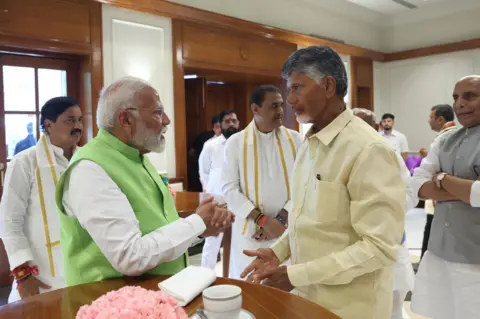 N Chandrababu Naidu/Twitter
N Chandrababu Naidu/TwitterEffective coalition politics demands collective action to function as a bloc and offer checks and balances. The key question now is what major issues the coalition partners and the BJP can agree upon.
Mr Modi’s party has been pushing for a controversial plan to hold simultaneous federal and state elections, something India gave up in 1967.
His party has also promised an Uniform Civil Code or UCC, a single personal law for all citizens, irrespective of religion, sex, gender and sexual orientation. This has been resisted in the past by both the country’s majority Hindus and minority Muslims.
Then there’s the delicate issue of redrawing of parliamentary boundaries, due after 2026. The wealthier, less populated southern states fear that Mr Modi will expand parliament, with the seat count favouring the poorer, more populous Hindi heartland states – a traditional BJP stronghold.
Mr Modi will also have to listen to regional and state-specific demands from the allies and accommodate their leaders’ ambitions. Both the TDP and JD(U) have demanded special status for their states, which mean more federal funds. The allies, according to media reports, are also eyeing influential ministries.
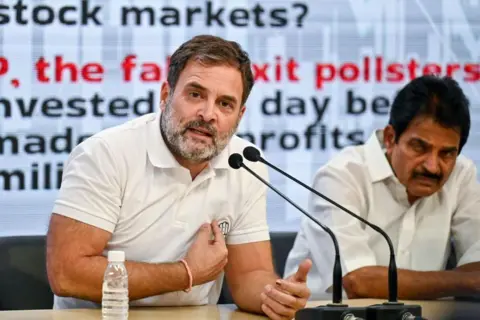 Getty Images
Getty ImagesDespite a rebounding economy fuelled by government spending, Mr Modi needs to create more jobs and boost incomes for the poor and middle class. India’s economy requires many structural reforms in agriculture, land and labour. Mr Modi may need a consultative approach with allies to achieve any of this.
For a man used to basking in the spotlight, consensual politics may not come easily to Mr Modi, many believe.
“He has suddenly been asked to enact a role that he has never done before in his life,” says Nilanjan Mukhopadhyay, a biographer of the prime minister .
But successful politicians master the art of reinvention. Will India now see a humbler, more consultative and consensual Mr Modi?
“We will have to wait and see,” says Sandeep Shastri, a political analyst. “We have to view this through the lens of current circumstances, not past alliances.” Watch this space.
BBC InDepth is the new home on the website and app for the best analysis and expertise from our top journalists. Under a distinctive new brand, we’ll bring you fresh perspectives that challenge assumptions, and deep reporting on the biggest issues to help you make sense of a complex world. And we’ll be showcasing thought-provoking content from across BBC Sounds and iPlayer too. We’re starting small but thinking big, and we want to know what you think – you can send us your feedback by clicking on the button below.
[ad_2]
Source link
